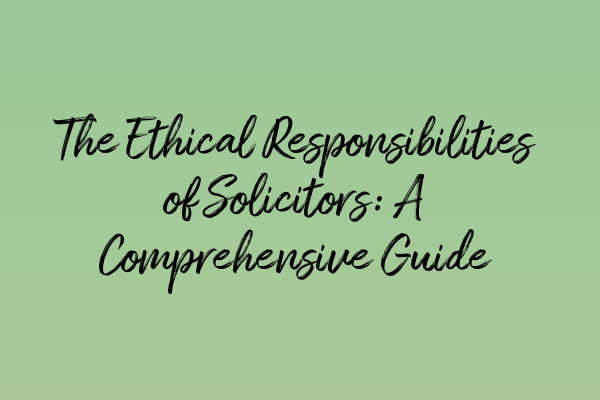The Ethical Responsibilities of Solicitors: A Comprehensive Guide
As a solicitor, you hold a position of trust and influence in society. With this position comes a set of ethical responsibilities that you must uphold in order to ensure the integrity of the legal profession and the confidence of the clients you serve. In this comprehensive guide, we will explore the key ethical responsibilities of solicitors and provide insights into how you can navigate these responsibilities with professionalism and integrity.
Professional Competence and Integrity
One of the core ethical responsibilities of solicitors is maintaining professional competence and integrity. This means continuously developing your legal knowledge and skills to provide the best possible service to your clients. It also means conducting yourself with honesty, fairness, and transparency in all your professional dealings. By staying up-to-date with legal developments and practicing with integrity, you can ensure that your clients receive quality representation and advice.
To further enhance your professional competence, consider enrolling in courses such as the Bar Professional Training Course (BPTC). This course will equip you with the necessary knowledge and skills to excel in your legal career and meet the high ethical standards expected of solicitors.
Client Confidentiality
Client confidentiality is another ethical responsibility that solicitors must prioritize. Maintaining the trust and confidence of your clients is essential, and this begins with protecting their confidentiality. This means safeguarding any information shared by your clients and not disclosing it to third parties without their consent, unless required by law or in exceptional circumstances.
Using technology in your practice can greatly enhance your ability to protect client confidentiality. By leveraging secure communication channels and encrypted storage systems, you can ensure that client information remains confidential and secure. To learn more about the role of technology in modern legal practice, check out our article on The Role of Technology in Modern Legal Practice.
Conflict of Interest
Avoiding conflicts of interest is crucial for solicitors in order to maintain professional integrity and the trust of their clients. A conflict of interest arises when a solicitor’s personal or professional interests conflict with their duty to act in their clients’ best interests. It is important to identify and address any conflicts of interest that may arise at the earliest opportunity.
If you find yourself facing a potential conflict of interest, it is essential to disclose the conflict to your client and seek their informed consent. In some cases, it may be necessary to decline or terminate representation to ensure that your duty to act in the client’s best interests is not compromised. By navigating conflicts of interest with transparency and integrity, you can maintain the trust of your clients and uphold your ethical responsibilities as a solicitor.
Professional Independence
Professional independence is a fundamental ethical responsibility for solicitors. This means acting in the best interests of your clients without any undue influence or pressure from external parties. It also involves maintaining your objectivity and not allowing personal or external factors to compromise your professional judgment.
In order to remain professionally independent, it is important to stay informed about current legal industry trends and developments. This will enable you to provide the best possible advice and representation to your clients. To learn more about staying ahead of current legal industry trends in the UK, read our article on Staying Ahead: Current Legal Industry Trends in the UK.
Professional Conduct and Ethics
Finally, solicitors must adhere to the highest standards of professional conduct and ethics. This includes maintaining respectful and professional relationships with colleagues, opposing parties, and the court. It also involves acting honestly and recognizing your duties to the court and to the administration of justice.
Financing your law degree and obtaining the necessary qualifications to become a solicitor can be a significant investment. To understand the costs and financing options available to you, check out our article on Financing Your Law Degree: Understanding Costs and Options.
By upholding these ethical responsibilities and providing ethical, professional legal services, you can contribute to the reputation and integrity of the legal profession. Remember, as a solicitor, you have the power to make a positive impact on the lives of your clients and society as a whole.
If you have any further questions or would like assistance with any legal matter, feel free to reach out to us at Become Solicitor SRA. We are here to support you in upholding your ethical responsibilities as a solicitor.


Leave a Reply